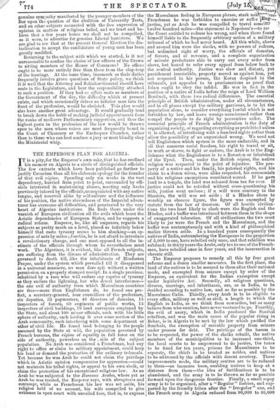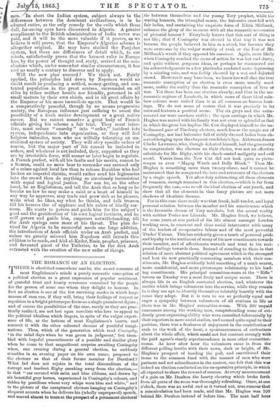THE EMPEROR'S PLAN FOR ALGERIA.
IT is a pity, for the Emperor's own sake, that he has confined his memoir on Algeria to a circle of distinguished officials. The few extracts which have been published go further to justify Cmsarism than all his elaborate apology for the founder of that evil regime. Spending only six weeks in the vast dependency, hurried from point to point, surrounded by offi- cials interested in maintaining abuses, meeting only Arabs previously tutored by the officials,unacquainted with any native tongue, and reserved alike by self-culture and the influence of his position, the native shrewdness of the Imperial adven- turer has overcome all difficulties, and penetrated to the very heart of Algerine institutions. He finds there under the varnish of European civilization all the evils which beset the Asiatic dependencies of European States, and he suggests a radical reform. Emperor, he, like all emperors, regards his Subjects as pretty much on a level, placed so infinitely below himself that caste tyranny seems to him shocking—an op- pression of ants by mites ; Jacobin, he is not afraid to introduce a revolutionary change, and one most opposed to all the in- stincts of the officials through whom he nevertheless must work. The Algerines, it is evident, like all French subjects, are suffering from the disease of administration. They are governed to death till, like the inhabitants of Hindostan Proper, under the system which prevailed till it disappeared in a universal massacre, no man dare spit without a written permission on a properly stamped receipt. In a single province, inhabited by a race who will endure any caprice of tyranny as they endure the lightning, but who detest interference— the one evil of authority from which Mussulman countries are free—more than Englishmen do, he found one pre- fect, a secretary-general, four councillors of the prefecture, six deputies, 33 paymasters, 46 directors of domains, 15 inspectors of forests, 60 engineers of public works, 15 inspectors of civil buildings, 79 land surveyors employed by the State, and about 100 minor officials, each with his little sphere of authority, each lording it over some section of the Arab community, each interfering with some department or other of civil life. He found land belonging to the people assumed by the State at will, the population governed by French bureaus, the regime of equality in full force on the side of authority, powerless on the . side of the subject population. No Arab was considered a Frenchman, had any right to office or claim to military appointment, could keep his land or demand the protection of the ordinary tribunals. Yet because he was Arab he could not claim the privilege which in Asiatic opinion compensates for oppression—could not maintain his tribal rights, or appeal to his own sheik, or claim the protection of his exceptional religious law. As an Arab he was subjected to the Bureaux Arabes, where yet as Arab he was treated, the Emperor says, with abruptness and contempt, while as Frenchman his law was set aside, his religion held of no account, his wife compelled to give evidence in open court with unveiled face, that is, to express
the Mussulman feeling in European phrase, stark nak 'ree- Frenchman he was forbidden to exercise or suffer Bng-ae justice, yet as Arab he was compelled to travel some1er twelve hundred miles—the statement is Napoleon's—to ree the Court entitled to redress his wrong, and when there found himself liable to the frequently arbitrary action of a military tribunal of which he had never heard. All this while, above and around him were the sheiks, with no powers of redress, but unlimited right of worry, the officials of domains, of forests, and of revenue, and a complete organization of minute prefectures able to carry out every order from above, but bound to refer every appeal from below back to the central authority. Justice was slow and distant, yet punishment irresistible, property sacred as against him, yet not respected in his person, the Koran despised in the tribunals, yet appealed to in proclamations as proof that Islam ought to obey the infidel. He was in fact in the position of a native of India before the reign of Lord William Bentinck, with these two radical differences. The essential principle of British administration, under all circumstances, and in all places except the military garrisons, is to let the population alone, to consider everything lawful which is not forbidden by law, and leave wrongs unredressed rather than compel the people to do right by preventive order. The
essential principle of French administration is the duty of organizing society, of regarding everything as prohibited unless it is allowed, of interfering with a hundred rights rather than allow the possibility of an unpunished wrong. We need not tell Englishmen which system is the more endurable, and in all that concerns social freedom, his right to travel or sit, to work or starve, to fight or endure, the Arab is to the Eng- lishman what the Englishman is to a Bavarian or inhabitant of the Tyrol. Then, under the British regime, the native religion was respected to the point of injustice. The pro- perty of a native and his family, his paternal rights, and his claim to a dozen wives, were alike respected, his ceremonials and his religious exemptions considered sacred. If he gave land to a temple, the land was released from tax for ever. If justice could not be satisfied without cross-questioning his wife, justice went undone ; if a will were contrary to the Shasters, the will was set aside ; if a Hindoo chose to worship an obscene figure, the figure was exempted by statute from the law of decorum. Of all hostile civiliza- tions the two least likely to clash were the English and the Hindoo, and a buffer was introduced between them in the shape of exaggerated toleration. Of all civilizations the two most likely to jar were the French and the Mussulman, and the buffer was contemptuously and with a kind of philosophical malice thrown aside. In a hundred years consequently the natives of India, outnumbering the Europeans in the proportion of 5,000 to one, have rebelled only once, and that rebellion was subdued; in thirtyyears the Arabs, only ten to one of the French- men, have rebelled once in four years, and the insurrection is chronic still.
The Emperor proposes to remedy all this by four great reforms and a dozen smaller measures. In the first place, the land of the natives is to be secured to them after their national mode, and exempted from seizure except by order of the Emperor, an equivalent for the Indian exemption except under legislative Act. Secondly, all religious questions, divorce, marriage, and inheritance, are, as in India, to be decided according to native law, and as far as possible by the Mussulman Cadis. Thirdly, every Arab is to be eligible to every office, military as well as civil, a length to which the English in India, as we think from cowardice, but as many believe from wise caution, have never ventured to go. Fourthly, the evil of usury, which in India produced the Sonthal rebellion, and was the main cause of the popular rising in Behar, is in Algeria to be met by the law which pacified the Sonthals, the exemption of movable property from seizure under process for debt. The privilege of the harem is to be respected, the power of the sheiks rebuilt, the native members of the municipalities to bo increased one-third, the local courts to be empowered to do justice, the taxes to be fixed for ten years, prisons for Mussulmans to be separate, the chiefs to be treated as nobles, and natives to be addressed by the officials with decent courtesy. These improvements made, the military centres are to be reduced to three—an immense boon, enabling natives to keep at a distance from them—the idea .of fortifications is to be abandoned, and the army is to be thrown as far as possible forward upon the dangerous frontier. Finally, a small sepoy army is to be organized, after a "Regular" fashion, and sup- ported by the friendly tribes after the " Irregular " one, and the French army in Algeria reduced from 90,000 to 46,000
men. /In short the Indian system, subject always to the differences between the dominant civilizations, is to be adopted entire, as the only remedy for the evils which those dull, far-seeing eyes have discovered in Algeria. A greater compliment to the British administration of India never was paid, and it will be the more valuable if it proves, as we believe it will prove, that the Emperor's Algerine scheme is altogether original. He may have studied the Punjabee system, but there are differences of detail which, to our minds, satisfactorily prove that the keenest ruler in Europe has, by the power of thought and study, arrived at the con- clusions which, under somewhat similar circumstances, it has cost us nearly a century to discover and to apply.
Will the new plan succeed ? We think not. Fairly applied, the principles laid down by Napoleon would no doubt result in• producing a settled, money-getting, and con- tented population in the great centres, surrounded on all sides by tribes neither hostile nor friendly, governed in all small matters by their own chiefs, and in all great affairs by the Emperor or his more immediate agents. That would be a comparatively peaceful, though by no means progressive society, the European influence just sufficing to arrest the possibility of a fresh native development or a great native career. But we cannot conceive a great body of French officials giving his scheme a fair trial. They must inter- fere, must reduce " anarchy " into "order," incident into system, independence into organization, or they will feel helpless imbeciles, men who are wilfully tolerating an un- civilized system of society. They will obey specific orders of course, but the major part of life cannot be included in orders, and whatever is not included, they, supported as they are by irresistible force, will sooner or later begin to regulate. A French prefect, with all his faults and his merits, cannot be a Roman, could no more bear to surrender one accused only of a crime against local law than to release Barabbas who had broken an imperial statute, would rather send his legionaries into the crowd than do anything so atrociously inconsistent with equal and logical justice. Nor can he, on the other baud, be an Englishman, and tell the Arab that so long as he breaks no law he may make a saint or a beast of himself in any way he approves, may trade and grow rich as he pleases, write what he likes, say what he thinks, and talk treason till his hearers tire of applause and his rulers of kindly sar- casm. He wants to govern and guide him for the subject's good and the gratification of his own logical instincts, and he wit/ govern and guide him, emperors notwithstanding, till the Arab springs once more at his throat. The plan de- vised for Algeria to be successful needs one large addition, the introduction of Arab officials under an Arab prefect, and unless we greatly misread him Napoleon still intends this addition to be made, and Abd• el-Kader, Emir, prophet, prisoner, and favoured guest of the Tuileries, to be the first Arab entrusted with the creation of the new order of things.































 Previous page
Previous page